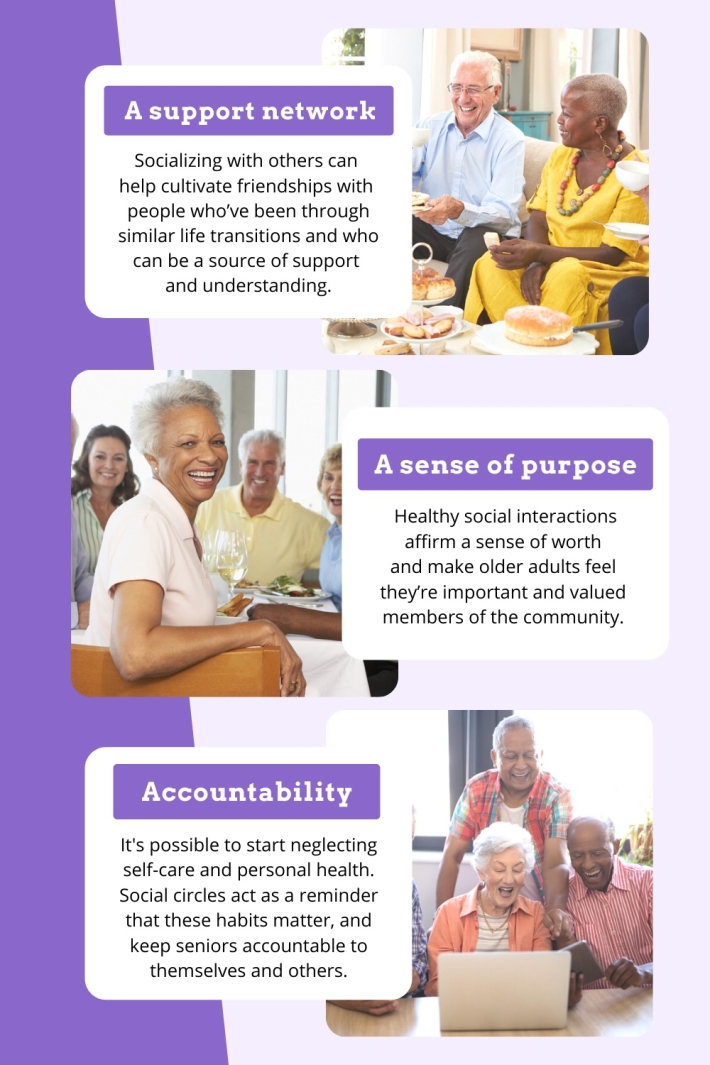The Benefits of Socialization in Seniors
Isolation can be detrimental to a senior's health. Learn about the benefits of socialization for both your mental and physical health!

Explore:
We all deal with loneliness from time to time. Life transitions such as relocating to a new place, the death of a loved one, or friends moving away all spark feelings of loss and isolation. It may take a while, but most of the time, we’re able to work through these transitions and carry on.

Socialization in seniors: why it’s important
When feelings of loneliness become chronic and pervasive, it’s a matter for concern. Our mental state has a direct impact on biological processes in the body. The stress of chronic loneliness triggers a “flight or fight” response that puts our body on a constant high alert. This leads to major negative health consequences, including depression, poor sleep, and cellular inflammation causing impaired immunity and accelerated cognitive decline.
For seniors who aren’t satisfying their social needs or lack a social circle that provides friendship and connection, poor health is the result. But more social interaction can remedy this.
According to a Canadian research study, when seniors increase the number of social activities they participate in, they feel more satisfied with life and more positive about their well-being. A study by the University of Queensland in Australia also found that older adults who take part in social groups such as book clubs or church groups have a lower risk of premature death.
Senior living communities and social health
Socialization in senior living communities makes it easy for seniors to improve social connections and decrease loneliness. Residents live close to their neighbors and are surrounded by staff, which is reassuring if friends or family don’t live nearby or aren’t able to visit often.
The opportunities for social interaction — from planned activities and outings to spontaneous introductions and conversations — are rich. Residents can choose to eat with others, instead of eating alone. They can participate in an activity or class, and open themselves up to new interest groups. Community transportation makes it easy to agree to an outing or go on a shopping trip for a stress-relieving day of fun.
These interactions affect all aspects of physical, emotional and mental health, rejuvenating a personal balance thrown off by life events:
- A support network — For a senior who’s lost a close friend or spouse, the need to belong can be intense. Socializing with others can help cultivate friendships with people who’ve been through the same life transition, and who can be a source of support and understanding. In seeking help, a senior can also give back, returning the favors of listening and counsel, and further strengthening the bonds of friendship and belonging.
- A sense of purpose — Healthy social interactions affirm a sense of worth and make older adults feel they’re important and valued members of the community. Volunteering and social events where they can contribute their time and talents foster a sense of purpose and build self-confidence.
- Accountability — Aging adults can slip into habits where they neglect self-care and personal health. Social circles act as a reminder that these habits matter, and keep seniors accountable to themselves and others, ensuring they continue to take care of themselves.
- Positivity — Living in a friendly and trusting community where you know your neighbors and are part of the lively day-to-day energy is an instant mood booster. It can improve the outlook of someone who’s been feeling alone and give them something to look forward to when they get up in the morning.
The lingering effects of the coronavirus pandemic remind us how destructive loneliness and isolation can be, especially for older adults. Socialization in seniors can be effortless in a community setting. It can ease the loneliness and isolation that affect older adults, and help them connect and thrive with relationships that improve their well-being.
Where You Live Matters is powered by the American Seniors Housing Association (ASHA), a respected voice in the senior housing industry. ASHA primarily focuses on legislative and regulatory advocacy, research, and educational opportunities and networking for senior living executives, so they can better understand the needs of older adults across the country.
